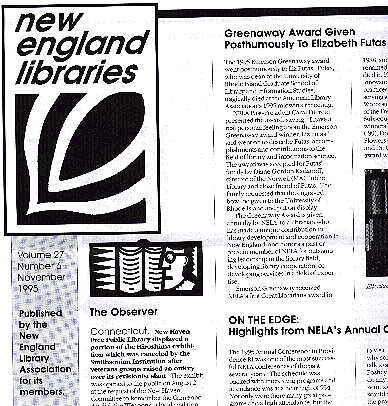



Interview with NELA Newsletter Editor1. What is your vision for the ALA?To me, the ALA is the means for maintaining the profession of library and information services as a cohesive body, bringing together the diverse interests as seen by its individual members, and defining, as a continuing process, the issues that are important to the profession. It is also a means for the profession to effectively to participate in the national political processes. My vision of the ALA is that it must be an organization remembering its past, continuing to build on the present, and ready for the challenges of the 21st century. While continuing its present roles, ALA will have to represent an increasing diversity of interests and deal with an increasingly complex array of issues. While issues of the past will continue to be important, there are many new concerns resulting from the revolutionary changes occurring in society, such as the impact of information technology on the economy, on the nature of work, on education, and on forms of recreation. These changes must be central concerns of the library and information profession. The American Library Association will serve as a primary means to deal with the impact of these changes effectively while maintaining librarianship's traditional values. As we are experience exceptionally complex political, economic, social, and cultural changes in the nation, changes that far transcend the profession of library and information service, ALA will ensure that the voice of the profession is heard. Dramatic changes are also occurring at the international level; since the profession is essentially international, not only in the materials with which it deals and the information contained in them, but in the sense of mutual responsibilities, international changes should also be considered by the ALA as it responds to future needs. 2. What should ALA's relationship be with its state chapters?My perception has been that state chapters function independently for most if not all of their work. The ALA, if that is true, is simply a means for coordinating state associations, providing a common forum but without control. If that indeed is the case, I see no reason for changing the relationship.3. What is your position on the idea of having regional chapter representatives (e.g. New England, Central Atlantic, etc...) rather than state chapter representatives?Regional library associations have been formed to provide a more effective forum for interaction and sharing among library and information professionals. The needs did not come from "organizational" domain. I see no reason for introducing regionalization; it would simply add another layer of bureaucracy without any real rationale. While there may be value in regionalism for national politics (though I doubt it), I see little for the profession. Most important to me is the fact that the states must continue to be represented in the political process of ALA. Given that, I see little to be gained by introducing another level of "bureaucracy", coordination, debate, and politics when the organization is already overwhelmed with all of those. We need to encourage more dialogue on professional interests and issues but less on politics.
4. Many librarian feel alienated from ALA. What would you do to address this issue?If there are feelings of alienation for some members of the ALA, they probably reflect a perception that the ALA is an overwhelming political structure -- as indeed it is. The myriad of organizational entities, each of which seems to embody its own set of political agendas and processes, may well create in the alienated member a sense of bewilderment and a feeling that one can have no effect. Given that much of the large scale process is seemingly overtly political, the person whose primary interest is professional rather than political will almost certainly feel alienated. Thus my answer to this problem is to strengthen the truly professional components of the ALA operations, to increase their visibility and their role, as well as their programming as represented by many "content-based" sessions at the divisional national meetings. Beyond that, the answer to the next question may also provide a means for addressing the needs of alienated members.5. How can ALA fully exploit the power of librarians who are ALA members but don't attend the annual conference?We must introduce mechanisms of national referenda, in which some of the political issues are moved from the context of open debate at the national meetings into the privacy of one's own thoughts. This would permit all ALA members, whether they attend the national meetings or not and whether they enjoy political debate or not, to participate, to feel that they can have a say, and thus reduce the sense of alienation. Of course, not all issues could be dealt with in this way, but many could be, especially if the referenda are regarded as advisory, necessitating formal actions to be translated into policy. |
| Home | Vision | Agenda | Connections | Professional | Personal |
|---|